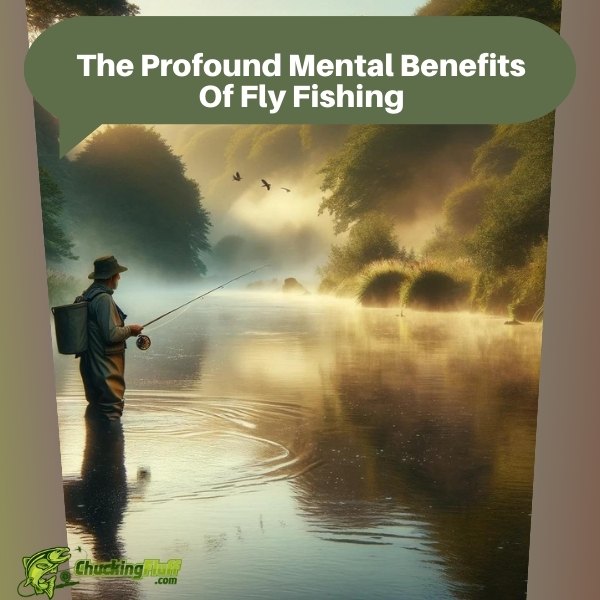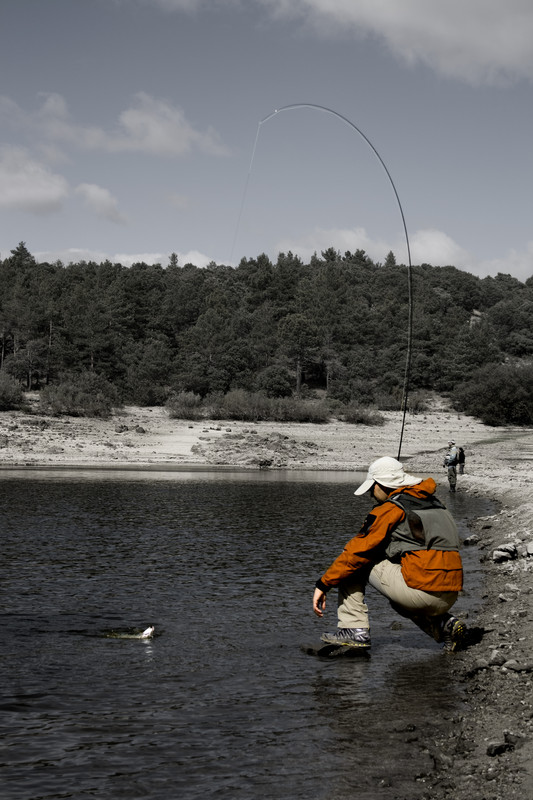| Disclosure: Just to be open and honest the buttons and links you click on in the website will in most cases take you to another website where you can purchase the products I am reviewing. As an Amazon Associate I earn from qualifying purchases. |
Embrace The Serenity: The Mental Benefits Of Fly Fishing

In today’s fast-moving world, carving out a niche for tranquility and mental equilibrium is essential. Fly fishing emerges not just as a hobby, but as a profound avenue for mental restoration and emotional enrichment.
Quick Post Navigation
- Enhanced Connection with Nature: A Natural Prescription for Health
- Mindfulness and Meditation through Movement
- Cognitive Benefits and Mental Challenges
- The Dual Nature of Social Interaction in Fly Fishing
- Reflection, Resilience, and Emotional Growth
- Conclusion: Fly Fishing as a Multifaceted Therapeutic Activity
- FAQs: Unveiling the Psychological Rewards of Fly Fishing
- “Check out some of our other Buying Guides”
Enhanced Connection with Nature: A Natural Prescription for Health
Fly fishing invariably takes place against the backdrop of nature’s quiet beauty—be it a babbling brook, a serene lake, or a vibrant river ecosystem. Immersing oneself in such settings can significantly ameliorate physiological markers of stress. Scientific studies corroborate that natural environments have a robust calming effect, lowering blood pressure and reducing the pulse rate. This natural therapy improves overall mental health, reducing feelings of stress and anxiety while promoting a peaceful state of mind.
Mindfulness and Meditation through Movement
The act of fly fishing is intrinsically meditative. The precise, repetitive motions required to cast and retrieve a fly demand a high level of mindfulness, which entails being fully present and immersed in the current activity, excluding external distractions. This practice mirrors mindfulness meditation techniques, known for their benefits in reducing symptoms of anxiety and depression. As fly fishers focus on their casting and the flow of water, they engage in a form of dynamic meditation, which brings about mental clarity and an enhanced sense of inner peace.
Cognitive Benefits and Mental Challenges
Fly fishing is replete with challenges that stimulate mental growth. Learning to master the casting technique, choosing the appropriate flies, and reading the water for signs of fish activity involve continuous learning and application of knowledge, which keep the mind active and engaged. These intellectual demands can boost cognitive functions, enhance problem-solving skills, and improve concentration. Furthermore, setting and achieving fishing goals boosts self-esteem and contributes to a feeling of accomplishment, fortifying mental resilience.
The Dual Nature of Social Interaction in Fly Fishing
This sport offers a unique blend of solitude and social interaction. While it can be a solitary endeavor allowing for personal reflection and escape from social fatigue, it also provides rich opportunities for engagement. Participating in fly fishing clubs, group outings, or tournaments can foster social connections and friendships. These social aspects are vital, as they offer emotional support and contribute to a sense of community and belonging, which are crucial for mental health.
Reflection, Resilience, and Emotional Growth
The reflective aspect of fly fishing encourages anglers to contemplate life’s broader questions and personal challenges while engaged in the gentle rhythm of casting. This introspection is a cornerstone of emotional resilience, helping individuals understand and manage their emotions more effectively. Additionally, the sport teaches patience and adaptability—qualities essential for dealing with life’s unpredictabilities. Each session by the water can serve as a lesson in persistence, especially on days when the fish aren’t biting.
Conclusion: Fly Fishing as a Multifaceted Therapeutic Activity
Beyond the thrill of the catch, fly fishing is a multifaceted therapeutic activity. It merges physical activity with emotional and mental health benefits, offering a holistic approach to stress relief and personal development. The simplicity of being in a natural setting, the focus required for the sport, and the joy of the catch converge to provide a potent form of mental therapy. For those seeking to disconnect from the chaos of daily life and engage in a rejuvenating activity, fly fishing presents an ideal solution.
Through these expanded insights, it becomes evident that fly fishing is not merely a pastime but a significant contributor to mental wellness and personal growth, offering anyone from novices to seasoned anglers a pathway to a healthier, more fulfilled life.
FAQs: Unveiling the Psychological Rewards of Fly Fishing
Q) How does fly fishing alleviate stress?
A) The rhythmic nature of fly fishing, combined with the serene outdoor settings, significantly lowers the body’s stress hormone, cortisol.
Q) Can fly fishing truly enhance mental health?
A) Absolutely. Fly fishing promotes mindfulness, which is effective in reducing anxiety and depression symptoms, thereby boosting overall emotional wellness.
Q) Is fly fishing conducive to mindfulness?
A) Indeed, the concentration required in fly fishing enhances mental clarity and emotional stability, akin to mindfulness practices.
Q) What are the communal benefits of fly fishing?
A) Fly fishing can be solitary or social, offering ways to connect with others through clubs and outings, thus enriching one’s social network and community ties.
Q) What frequency is recommended for fly fishing to experience its benefits?
A) While the frequency can vary, even occasional outings can offer significant benefits. Regular participation can further enhance and sustain its mental health rewards.
Q) Is fly fishing suitable for all ages?
A) Yes, it’s a low-impact activity that can be enjoyed by nearly anyone, providing a calming hobby for the young and the elderly alike.
Fly fishing is not just an activity; it’s an immersion in nature, a commitment to mindfulness, and a community experience, making it a comprehensive approach to mental health and well-being.


